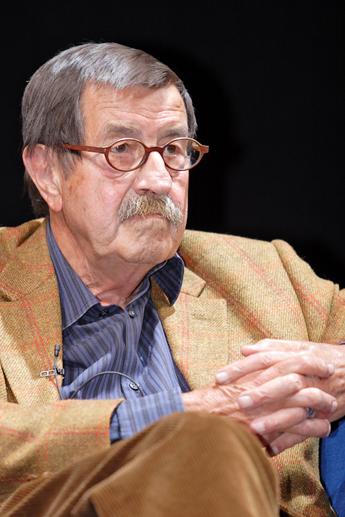Gunter Grass (1927-2015): Re-Righting Painful German Memories
By • May 11, 2015 0 1912

One of the obituaries that almost immediately hit the Internet after the death, at 87, of Gunter Grass, the Nobel Prize-winning German novelist, focused strongly on his admission in the autobiographical work, “Peeling the Onion,” that he had been a draftee in the Waffen-SS, the Nazi Party’s soldiers—a fact that he had not exactly kept hidden but had not dealt with in his voluminous writings of novels, fiction, stories, autobiography and poems.
The revelation, which came seven years after he had won the Nobel Prize, caused a bit of an uproar among the literati, and Grass himself tried to explain away the omission as an outcrop of his sense of shame.
But in truth, he didn’t need to do even that. For all of his writing life, the subject was always German literary, cultural, societal and moral loss of memory or re-arranging of the same, which afflicted many adult Germans who survived the war.
In that gigantic genius of an imaginative work, “The Tin Drum,” his main character was a boy who willed himself not to grow physically, who had a gift with playing hypnotically on a tin drum and a scream that broke glass and eardrums. The boy, Oskar Matzerath, grew up in the much fought-over city of Danzig and grew to emotional maturity throughout the war, watching betrayals, bombings, serving in the army, and generally becoming a devout cynic, a survivor who saw the devastating, ruinous, morally decrepitude and slaughter of the war: Germans winning, then waning and Russians invading.
All of his books—“Cat and Mouse” and “Dog Years,” which, with “The Tin Drum”—formed his Danzig trilogy, as well as later books, were about the effects of the rise of the Nazi state, the scalding devastation and punishment of the war, and the post-war years. It was a German—and a Catholic at that—dealing with the moral effects of memory, of forgetting willfully or pragmatically things that should be impossible to forget. German survivors were not crippled by the war, they were, in a way, invigorated and energized to affect a phenomenal rebuilding of the state and country. Today, Germany, pacified and pacificist, and re-unified is the master of Europe, economically.
In one way or another, Grass, whose works in translation managed to preserve the lyricism, the wicked, metaphor-rich styles of writing, dealt vividly with what is remembered, and what the memories mean—his characters are not about atrocities, but about moral betrayals and outrages, about sexual excess and sexual betrayal as well, and they are paradoxically rich in humor, especially books like “The Tin Drum,” the surreal “Dog Years,” which is about Hitler’s dog, and “The Flounder,” a hefty almost whimsical work of magical realism and folk tall tale.
Grass was more than a writer. He was the novelist as conscience, questioner, left-wing politician. He was, as one person described him, a citizen-writer. Grass said once that writers should always “keep their mouths open.” Only Heinrich Boll matched his gift for unapologetic scrutiny.
He was a teenager when he was in the Waffen-SS and died an old man, spanning war, defeat, resurgence, re-unification, deflecting controversy and creating it. Writers like Grass are rare these days, when the Great American Novel is a little like a dream few American writers pursue. You can find his ilk in the great Latin American writers like Marques, Allende and Fuentes, whose writing were part magic, part hidden politics and full-blooded dreams.
I read “The Tin Drum,” when I was college-age and without fully understanding the multi-ethnic—Slav, German, Polish—aspects of it, or being familiar with Danzig. I responded strongly to the book. The book was oddly perverse and entertaining, full of violence and the kind of Grimm fairy tale—adult version—aspects that were familiar to me.
Grass’s subject—the slippery status of memory in Germany—hit home to me: I was a decade and a half behind Grass in his experience, born in Munich, with a first memory of American tanks driving over the rubble of Munich in 1945, tossing out candy bars, for which, like any hungry kid, I fought. I emigrated to the U.S. in 1952 at age 10, and that’s when I first discovered what happened in Germany, in a book about Nazi war crimes, the Holocaust, Hitler and everything else with pictures.
It’s hard to take in then, and now, still, and Grass met that subject of memory elusively, including his own. My relatives essentially claimed a kind of not-remembering. I had three uncles which almost sum up the war—an infantry soldier killed in Russia, another an SS major and the third, an intellectual member of the German underground. That, at least, were the stories, I was told. They died so long ago.
We all do these things to move into a different life. Somewhere, I stopped using my real name of Gerhard and went to Gary, instead. People sometimes get tired of being different, far from home. Grass gave a lot of thought to who he was and when he was: the result are pages and pages of forever memories and their meaning.

